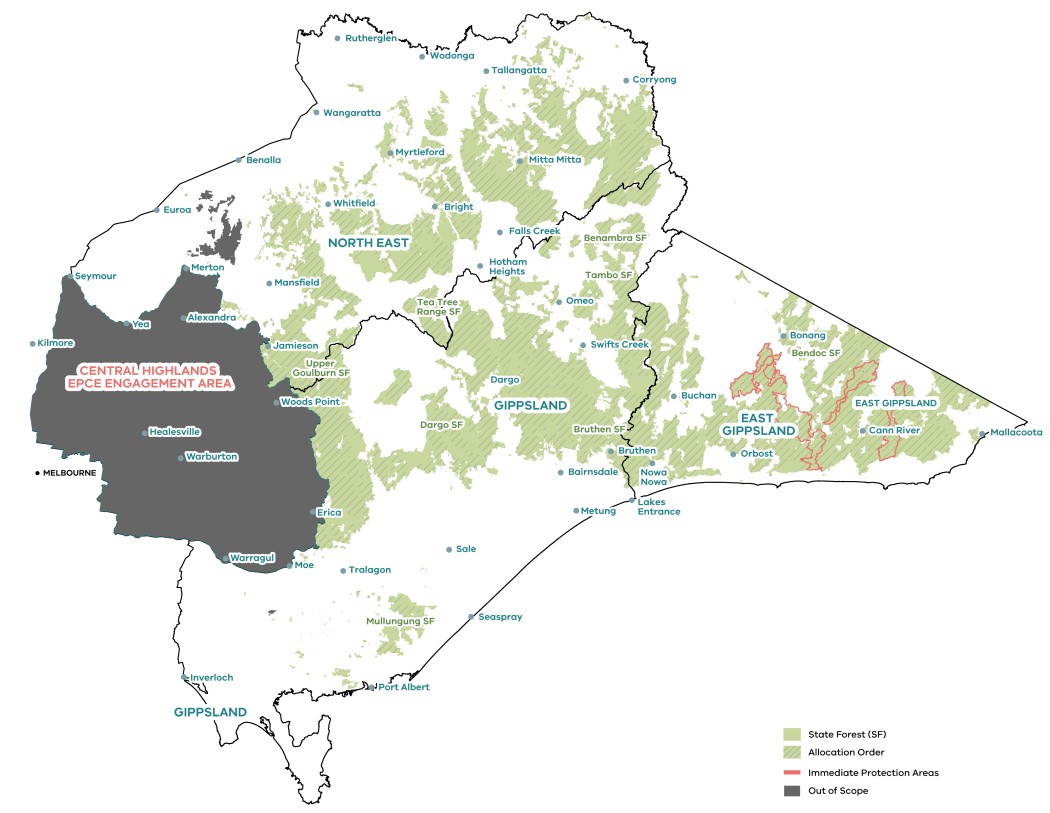To inform the future use and management of Victoria’s forest estate, a new Great Outdoors Taskforce has been established.
The Taskforce is making recommendations to government to ensure shared benefits for all Victorians – focusing on building regional economies, maximising tourism and recreation opportunities, while also ensuring forest values are protected for future generations.
This includes:
- identifying opportunities to protect the environment and support recreational, social and economic outcomes
- identifying opportunities for Traditional Owner management
- identifying areas of state forest where recommendations can be made now, and
- advising on where more partnership and engagement work needs to be done.
The Taskforce is different to the Eminent Panel for Community Engagement that has engaged with Victorians on the future management and uses of the Central Highlands, Strathbogie Ranges and Mirboo North state forests.
As part of this work, the Victorian Environmental Assessment Council is a conducting a scientific values assessment of the area to support understanding of forest values. The Taskforce has also sought economic, recreation and Country biocultural values assessments. These are all just some of the many inputs the Taskforce will consider in making its recommendations.
The Taskforce has now finalised its engagement and will be providing its report and recommendations to the Minister for Environment by mid-2025.
Traditional Owner partnerships
The Taskforce is partnering with Traditional Owners on this work.
A Traditional Owner partnerships approach has been developed that outlines Traditional Owner involvement in the Taskforce, configuration of the Taskforce for matters relating to Country, and relevant knowledge sharing forums to support this work.
The Taskforce is partnering with Registered Aboriginal Parties from the assessment area – Gunaikurnai Land and Waters Aboriginal Council, Taungurung Land and Waters Aboriginal Council and Yorta Yorta Nation Aboriginal Corporation – on this work.
Assessment area
The Taskforce is considering 1.5 million hectares of state forests previously managed for timber – the largest single public land assessment ever undertaken in Victoria.
It will also consider relevant adjacent state forests (about 590,000 hectares), where assessment of these areas supports a cultural landscapes approach for Traditional Owners or will help with management continuity.
State forests in the Central Highlands area, as well as the Strathbogie Ranges and Mirboo North were considered by the Eminent Panel for Community Engagement and are not a focus of the Taskforce.

Further detailed maps are available via the links below:
Victoria’s Forests – A Landmark Opportunity
Victoria is home to some of the most impressive forests in the world. The rich biodiversity found in our forests provides habitat for unique animals and plants that are not found anywhere else, as well as a much-loved backyard for Victorians and visitors to explore.
The end of native timber harvesting in Victoria presents a landmark opportunity for Victorians to reimagine the future use of our state forests and how they can be managed. It presents a chance for government, Traditional Owner groups, local agencies, and the community to work together to develop longer-term objectives, partnership approaches and plans for the shared use and care of our forests.
We want people to continue to undertake the activities they love, while at the same time ensuring enduring and sustainable environmental management practices. Improved management will help more people access our forests and experience nature, whilst ensuring our forests are resilient in the face of climate change, population growth, and increasing emergency events.
Message from The Great Outdoors Taskforce
October 2024
The Great Outdoors Taskforce has been established to consult with the Victorian Community and provide recommendations to government on how Victoria can approach future use and management of Victoria’s state forests that were previously subject to timber harvesting.
It’s important to note that the Taskforce is different to the Eminent Panel for Community Engagement that has been engaging with Victorians on the future management and uses of the Central Highlands, Strathbogie Ranges and Mirboo North state forests.
The Taskforce wants to hear from stakeholders and the community about your ideas for improved management of forests to support recreation and tourism whilst ensuring the forests we love are protected for future generations.
We know that the greatest threats to the sustainability of our forests and the environment are the effects of climate change, bushfires (which are stronger and more frequent), as well as the challenge of pest plants and animals.
These threats don’t obey lines on a map and occur across all land tenures. The Taskforce understands that good conservation management to mitigate these threats must be a core function of all public land managers and will consider how this can best be achieved in the Taskforce assessment area.
The Taskforce knows that accessing our forests for recreation and tourism and improving our biodiversity and conservation efforts can go hand in hand, and planning for these shared objectives can usher in a new era of state forest management.
Because of this, the Taskforce will not be making any recommendation for large-scale changes to land tenure, including not creating any new national parks.
Instead, this Taskforce will actively focus on how this land can be managed responsibly for the future enjoyment and benefit of all Victorians. The Taskforce is seeking your knowledge and expertise to understand how we can meet the challenge of managing forests for multiple uses, as well as learn about new ways of working together that build collaborative management practices to draw on our collective capacity and expertise to manage forests in an increasingly complex and challenging environment.
To shape its recommendations, the Taskforce is seeking your knowledge on:
Locations of importance
- identifying areas of land where specific environmental management practices are required to improve biodiversity outcomes and ensure our threatened species thrive
- identifying key areas that are important for recreation and tourism
- identifying areas of land where tourism and recreational opportunities can be developed
Governance and management
- identifying opportunities for Traditional Owner management
- collaborative governance and management models for partnerships across agencies, stakeholders, subject matter experts, user groups and the general public
Future of state forests
- identifying conservation management opportunities and activities for state forests
- identifying models and plans that enable recreation, tourism, and biodiversity projects to generate social and economic outcomes for regional communities
- identifying Indigenous land management perspectives and practices that support new understandings of the social, economic, and recreational relationships Traditional Owners have with Country (e.g. Biocultural Expressions, that teach us to understand the relationships between the biophysical, social, spiritual and cosmological aspects of Country)
Prioritisation process for decision-making on the assessment area
- prioritising areas of state forest where decisions are required in the next 1-2 years, and identifying areas that would benefit from further engagement and discussion before decisions should be made regarding land management outcomes
As part of this work, the Victorian Environmental Assessment Council is conducting a scientific values assessment of the area to support understanding of forest values. The Taskforce has sought economic, recreation and Country biocultural values assessments. These are just some of the many inputs the Taskforce will consider in making its recommendations.
Bushfire Management
It is outside the scope of the Taskforce’s mandate to make recommendations on planned burns or other mechanical bushfire risk reduction treatments in this process.
More information about engagement opportunities for the Great Outdoors Taskforce will be provided soon.
Members
Lisa Neville, Chairperson
Lisa Neville has been appointed as the Chairperson of the Great Outdoors Taskforce.
Lisa has significant experience in leadership and was Victoria’s first female Minister for Police and first Minister for Mental Health. Lisa has also been Minister for Police and Emergency Services; Community Services; Community Services; Senior Victorians; Aged Care; and Children.
In her role as a Water Minister, Lisa was a fierce advocate for the water portfolio working sensitively and respectfully with Traditional Owners to recognise their deep and ongoing connection to land, water and resources.
Lisa has also formerly served as a member for Bellarine in the Victorian Legislative Assembly for 20 years. In this role, Lisa represented the diverse regional communities in the electorate.

Karen Cain, Member
Karen is the current Chair of the Eminent Panel for Community Engagement that is conducting engagement in the Central Highlands.
Karen has significant senior experience working across government, leading strategic innovation, and developing and implementing policy in the public sector.
Karen was previously appointed as Chief Executive Officer at the Latrobe Valley Authority, as well as Director Community Transition Forestry with the Department of Jobs Precincts and Regions.

Melissa Wood, Member
Mellissa is the current Chair of the Victorian Environmental Assessment Council and member of the Eminent Panel for Community Engagement.
Mellissa has over 30 years’ experience in leading and providing scientific and policy advice on sustainable development; resource and environmental management; and international agricultural research for development. She has held Executive positions with the Australian Federal Government and internationally, including UN Food and Agriculture Organization (FAO).

Graeme Dear, Member
Graeme is the current Board Chair of the Victorian Fisheries Authority and has served as an Independent Director for Gunaikurnai Land and Waters Aboriginal Corporation (GLaWAC).
Graeme has significant experience spanning 30 years across the Private and Public Sector in fisheries practice, administration, research and policy.

Terry Robinson, Member
Terry is the current Chief Executive Officer of Destination Gippsland. In this role, Terry provides leadership to the Gippsland visitor economy.
With over 20 years of experience Terry has extensive knowledge of the tourism industry in Gippsland and has built significant relationships across the Victorian Tourism Industry. Terry has a strong interest in economic and community development in Gippsland.
Terms of Reference
Page last updated: 14/04/25
